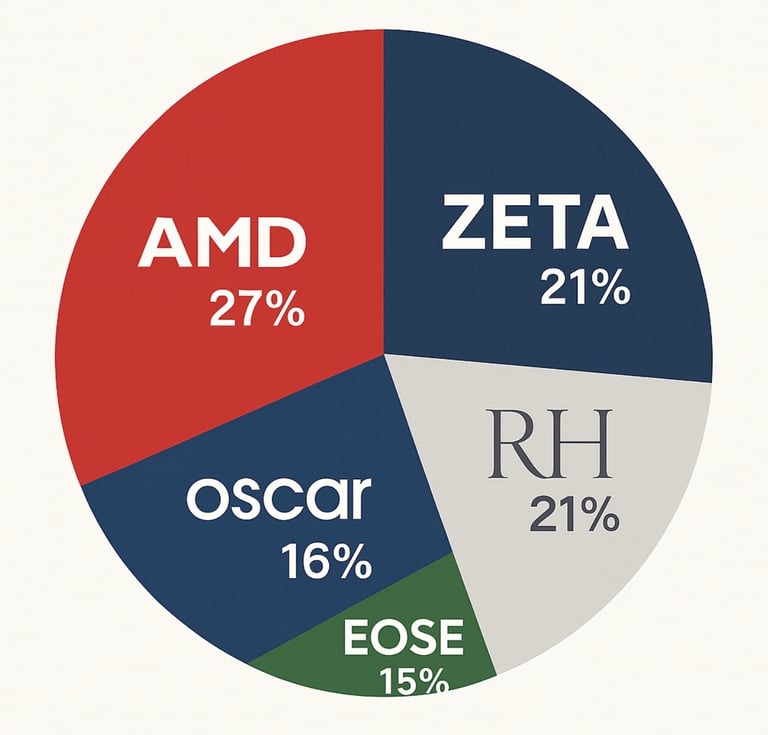Stock Portfolio - US
Bullish Investment Thesis: AMD, Zeta Global, Oscar Health, EOSE, RH
1. AMD (Advanced Micro Devices)
Sector: Semiconductors & High-Performance Computing
AMD is positioned as a key player in the rapidly expanding semiconductor space, driven by accelerating demand in AI, cloud computing, gaming, and high-performance computing. While AMD may not yet match NVIDIA in terms of valuation or GPU dominance, it is quickly gaining ground with its MI300 series targeting AI workloads, and its EPYC server CPUs maintaining robust market penetration.
From a strategic standpoint, AMD benefits from long-term enterprise partnerships with hyperscalers such as Microsoft Azure, Google Cloud, and Amazon Web Services, securing multi-year revenue visibility. The company’s gross margin expansion (currently around 51%) and R&D intensity (>20% of revenues) underpin its innovation trajectory.
CEO Dr. Lisa Su is widely respected for transforming AMD into a high-growth, innovation-driven company. The firm maintains a lean balance sheet with a solid cash position and manageable debt. Relative to its peers, AMD trades at more reasonable forward multiples, offering asymmetric upside in a trillion-dollar industry.
2. Zeta Global (ZETA)
Sector: AI-Powered Marketing Tech
Zeta Global combines proprietary AI with a scaled data platform to drive customer acquisition and retention solutions for enterprise clients. The company’s revenue growth has accelerated sequentially, achieving +20% YoY, while gross margins exceed 60%, showing strong unit economics.
Zeta’s business model is asset-light, with positive adjusted EBITDA and improving operating leverage. The company is trading at attractive EV/Sales and EV/EBITDA multiples relative to SaaS peers, despite superior revenue visibility.
Key risks remain on the regulatory front, particularly in its data-sharing ecosystem and reliance on third-party platforms like Google. However, these are partially mitigated by a strong in-house engineering team and diversification into first-party data channels. CEO David Steinberg has steered the company with capital discipline and market foresight. Zeta is a textbook example of how smart execution can unlock value in a crowded space.
3. Oscar Health (OSCR)
Sector: Health Insurance & Digital Health
Oscar is disrupting the fragmented and inefficient U.S. healthcare insurance industry by offering technology-first, consumer-centric insurance plans. Unlike traditional insurers, Oscar uses data-driven decision-making, streamlined UX, and preventive care features to reduce churn and medical costs.
Despite recent losses, the firm is nearing breakeven with a clear path to profitability, aided by improved Medical Loss Ratios and administrative cost efficiency. Premium revenues continue to rise, and membership growth is particularly strong in key metropolitan areas.
The U.S. healthcare system is under immense structural pressure, and Oscar stands out by tackling inefficiencies through digital infrastructure and real-time claims data. The company's risk-adjusted returns could become increasingly attractive as it gains scale and leverages its core technologies.
4. Eos Energy Enterprises (EOSE)
Sector: Long-Duration Energy Storage
EOSE is developing zinc-based battery storage systems aimed at replacing lithium-ion in long-duration grid applications. This is a bold moonshot investment with binary risk, but if commercialization succeeds, the upside is enormous given the global push toward renewable energy and grid decarbonization.
Their Znyth® technology offers several advantages: non-flammable, non-rare earth materials, and stable performance under extreme environmental conditions. EOSE has initiated pilot deployments and is targeting utility-scale clients.
5. RH (Restoration Hardware)
Sector: High-End Home Furnishings, Lifestyle & Hospitality
RH represents a differentiated player in the luxury furnishing and lifestyle market, uniquely positioned at the convergence of design, architecture, and experiential retail. While many traditional furnishing companies have struggled with margin compression and shifting consumer behavior, RH has managed to thrive by establishing itself not just as a retailer but as a design-led lifestyle brand.
One of the primary reasons I’m bullish on RH is its ability to scale premium design sensibilities while maintaining brand exclusivity. RH operates with industry-leading gross margins (~50%), strong free cash flow generation, and a vertically integrated model that provides direct control over manufacturing, distribution, and logistics.
Importantly, with interest rate cuts expected in the upcoming quarters, the housing and discretionary furnishing cycle is poised for a rebound, and RH is strategically positioned to capture demand from high-end consumers. While many peers compete on price, RH competes on aesthetic value, timeless design, and experiential luxury—a space with less pricing pressure and higher customer loyalty.
The company's aggressive expansion into international markets and architecturally stunning showrooms (e.g., in London, Aspen, and Milan) demonstrates confidence in its brand scalability. Its foray into RH Guesthouses, RH Residences, and curated hospitality concepts further deepens its customer relationship beyond transactional retail—enhancing retention and customer lifetime value.
CEO Gary Friedman is a visionary leader, often regarded as one of the most strategic thinkers in modern retail. Under his leadership, RH has consistently pushed boundaries, investing heavily in design, architectural innovation, and content curation.
From a valuation perspective, RH trades at modest forward P/E and EV/EBITDA multiples, especially when adjusted for its real estate assets and cash generation. Given the company’s long-term ambitions to become a global luxury brand akin to LVMH or Hermès (but in lifestyle and interiors), the upside potential is structurally underestimated.


